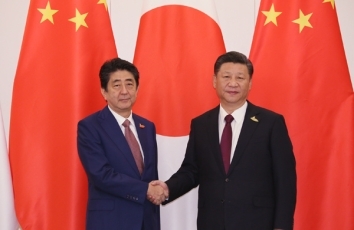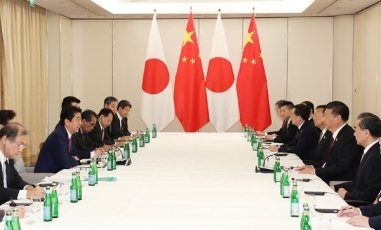Japan-China Relations
Japan-China Summit Meeting
 (Photo: Cabinet Public Relations Office)
(Photo: Cabinet Public Relations Office)
 (Photo: Cabinet Public Relations Office)
(Photo: Cabinet Public Relations Office)
On July 8, for approximately 40 minutes (simultaneous interpreting) starting from 9:00 a.m., Prime Minister Shinzo Abe held meeting with Mr. Xi Jinping, President of the People’s Republic of China, at a hotel in Hamburg, Germany, where the leaders were visiting to attend the G20 Summit. The overview of their meeting is as follows. (The Japanese participants included Deputy Chief Cabinet Secretary Kotaro Nogami,, Secretary-General of the National Security Secretariat Shotaro Yachi, Special Advisor to the Prime Minister Eiichi Hasegawa, Deputy Minister for Foreign Affairs Takeo Akiba,, and other officials; the Chinese participants included State Councilor Yang Jiechi, Minister of Foreign Affairs Wang Yi, and other officials).
1. Opening Remarks
(1) In his opening remarks, President Xi stated the following:
Japan and China are mutually important neighbors, and the sound development of Japan-China relationship contributes to the welfare of both countries’ citizens and also has an important influence on Asia and the world.
We also held a meeting on the occasion of the G20 Hangzhou Summit last year. This year marks the 45th anniversary of the normalization of diplomatic relations between Japan and China. Next year is the 40th anniversary of the conclusion of the Treaty of Peace and Friendship between Japan and China.
In this circumstance, Japan and China should possess a sense of responsibility and mission in encouraging the Japan-China relationship to improve and develop in a proper direction.
(2) In response, Prime Minister Abe stated the following:
I hope to celebrate the 45th anniversary of the normalization of diplomatic relations together with President Xi. A baby panda born at Ueno Zoo last month is growing healthily. Looking ahead to the 40th anniversary of the conclusion of the Treaty of Peace and Friendship between Japan and China next year and beyond next year, I hope to further and substantially cultivate the momentum for improving the relationship.
As the world’s second and the third largest economies, China and Japan share a significant responsibility to contribute to the stability and prosperity of the region and the world. In particular, North Korea’s nuclear and missile development constitutes a new level of threat and is a pressing issue, and I hope to strengthen cooperation with China on this issue.
2. Japan-China Relationship
(1) Overview
i. President Xi stated the following:
(i) Based on the experiences and lessons of the 45-year period since the normalization of diplomatic relations between Japan and China, the two countries should both adopt a comprehensive and long-term perspective, secure an accurate grasp of the broad direction of peace, friendship and cooperation, and also make steady efforts on the action front. I hope to proceed to improve Japan-China relations based on actual action, while attaching importance to the political foundation that includes the four political documents between the two countries.
(ii) Since the normalization of diplomatic relations, the four basic documents that Japan and China both agreed upon have formed the political foundation for Japan-China relations, including the Taiwan issue.
(iii) Economic and trade cooperation is the driving force of Japan-China relations, and working-level cooperation should be promoted.
(iv) We can pursue broad-ranging exchanges in fields such as culture, education, media, the regions and youth, and thereby solidify the foundation of social and public opinion in the bilateral relationship.
ii. Prime Minister Abe stated the following:
(i) 45 years ago, Japan and China achieved the normalization of diplomatic relations by issuing the Japan-China Joint Statement, and the Treaty of Peace and Friendship between Japan and China also confirmed progress with peaceful and friendly relations. When I visited China in 2006 I proposed the concept of the “Mutually Beneficial Relationship Based on Common Strategic Interests.” The Joint Statement issued in 2008 confirmed the principle that Japan and China are “partners for cooperation and should not pose a threat to each other.” These ideas form the foundation of Japan-China relations.
(ii) I intend to move ahead with building a new relationship between Japan and China. Asia is the source of global economic growth. At the same time, it also faces various challenges. Against such backdrop, I hope that Japan and China will both collaborate to overcome various challenges, including global challenges.
(iii) Frequent communication between the two countries’ leaders will contribute significantly to invigorating both countries’ economic activity and to improving national sentiment in both countries.
(iv) I hope to hold the Japan-China-Republic of Korea (ROK) Summit Meeting promptly and jointly open a path for our relationship, while taking into consideration realizing reciprocal leaders’ visits.
(v) Japan’s position with regard to Taiwan is as expressed in the Japan-China Joint Statement of 1972. The peace and stability of the Taiwan Strait is extremely important for the region and the world. I hope peaceful resolutions will be reached through dialogue between the concerned parties.
iii. Furthermore, the two leaders shared views on the following points:
(i) Both countries will continue to pursue improvements in Japan-China relations and move forward to building a stable relationship, with the agreements reached between Japan and China thus far as the foundation, such as the Japan-China Joint Statement and the Treaty of Peace and Friendship between Japan and China.
(ii) In particular, it will be important for both of the two countries’ leaders to exercise leadership in order to pursue improvements in the relationship, and to carry out direct dialogue. Dialogues between the two leaders should be strengthened by utilizing the opportunities presented by various international meetings and possible bilateral visits in the future.
(iii) The 45th anniversary and the 40th anniversary are ideal opportunities to pursue people-to-people exchanges. Initiatives related to the two anniversaries will be mutually strengthened, and this trend will be further expanded by utilizing the opportunities presented by the Tokyo Olympic and Paralympic Games in 2020 and Beijing Olympic and Paralympic Games in 2022, respectively.
(iv) For the benefit of both countries’ citizens also, cooperation on the economic front will be developed further, and cooperation will be deepened in every field, including finance, tourism, trade, and the environment and energy conservation. In particular, where Japan-China finance cooperation is concerned, the relevant authorities will proactively pursue communication.
(v) Japan and China will discuss how to contribute to the stability and prosperity of the region and the world, including the One Belt, One Road initiative.
(vi) There are various challenges between Japan and China, but it will be important to pursue development with the view that the economy should be dealt purely as an economic issue, and people-to-people exchanges should be enhanced as it is.
(2) Appropriately dealing with matters of concern
i. Prime Minister Abe requested the Chinese side to ensure the improvement of the situation in the East China Sea. Prime Minister Abe also pointed out that free and open maritime order based on the rule of law is important in all regions.
ii. In response, President Xi stated that the peace and stability of the East China Sea would be maintained.
iii. Both leaders shared the view that they would jointly make efforts to begin operation of a Maritime and Aerial Communication Mechanism between Japanese and Chinese defense authorities promptly. In addition, the Japanese side urged the implementation of the “2008 agreement” on Japan-China cooperation in the East China Sea.
iv. Prime Minister Abe mentioned recent incidents involving detained Japanese nationals and requested a positive response.
3. North Korea
(1) Prime Minister Abe stated the importance of increasing pressure on North Korea at this time, as well as the great significance of China’s role, and he strongly encouraged China to fulfill a more constructive role. Prime Minister Abe expressed his hope for cooperation on the abductions issue.
(2) Both leaders confirmed that the denuclearization of the Korean Peninsula is a common goal for Japan and China, and shared the view that they would work on the issue more closely.

